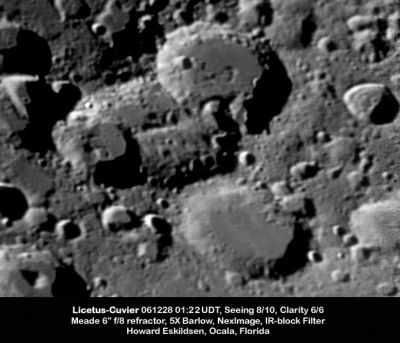Licetus
Contents
Licetus
| Lat: 47.1°S, Long: 6.7°E, Diam: 74 km, Depth: 3.53 km, Rükl: 65, pre-Nectarian |

Howard Eskildsen Licetus is at the top, overlapping Heraclitus. Cuvier is to the lower right.
Images
LPOD Photo Gallery Lunar Orbiter Images Apollo Images
Maps
(LAC zone 112C3) LAC map Geologic map
Description
Description: Elger
(IAU Directions) LICETUS.--An irregular formation, about 50 miles in maximum width, on the S. of Stofler, with the flanks of which it is connected by a coarse valley. Neison points out that it consists of a group of ring-plains united into one, owing to the separating walls having been partially destroyed. This seems to be clearly the case, if Licetus is examined under a low sun. On the W. side of the N. portion of the formation, the wall rises to nearly 13,000 feet.
Description: Wikipedia
Additional Information
Depth data from Kurt Fisher database
- Westfall, 2000: 3.53 km
- Viscardy, 1985: 3.8 km
Nomenclature
- Named for Fortunio Liceti (1577-1657), also known as Fortunius Licetus, an Italian physicist, philosopher and doctor. He was noted for his expertise on Aristotle. He was also known for unusual proposals and investigations, including topics in astronomy, phosphorescence, gems, and mysticism.
- The present feature is part of a complex of craters given the name Licetus by Riccioli.
- The present component was Catalog number 3414 in Mary Blagg's Collated List. A note (page 175) indicates the Julius Schmidt restricted the name to this part, known as Licetus a in Beer and Mädler and Neison, 1876, giving the name Heraclitus to another part.
- Schmidt's definition was adopted in Named Lunar Formations (1935).
- Licetus F was called Wright by Wilkins and Moore, but the IAU did not accept that name. William Hammond Wright (1871-1959) is one of three people currently honored by the crater name Wright.
LPOD Articles
Bibliography
Hill, Harold. A Portfolio of Lunar Drawings, pages 184, 185.